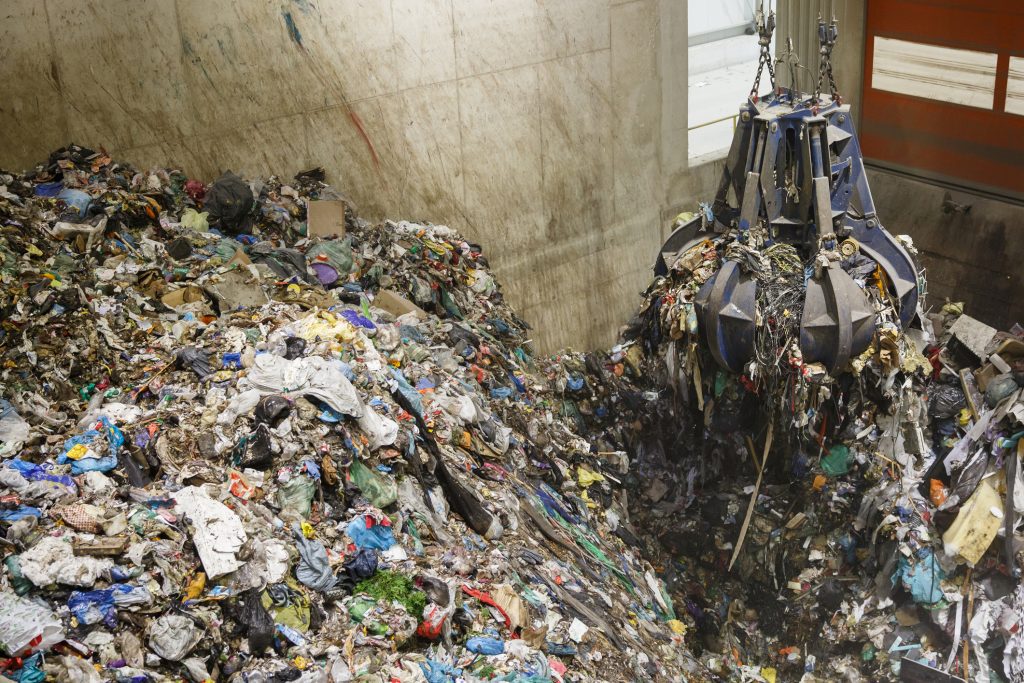Penn and Teller's Bullshit like 20 years ago talked about the bullshit (obviously) concerning recycling. IIRC only aluminum cans and glass are worth recycling out of the commonly known things the public is told to recycle.
So Apparently “Recycled” Plastic Was Always a Lie
- Thread starter hanselthecaretaker
- Start date
Recommended Videos
Steel, paper, cardboard and other wood products are also good IF done properly, otherwise they can be the worst polluters as well.Penn and Teller's Bullshit like 20 years ago talked about the bullshit (obviously) concerning recycling. IIRC only aluminum cans and glass are worth recycling out of the commonly known things the public is told to recycle.
Going back to using more glass products would be good IF we could counteract the increased weight issue somehow.
Would extreme heat break those down? Like, fusion temperature?The same chemicals that are being released into the atmosphere from creating and burning plastic and as it breaks down over time are still being released when we are melting it is the problem and due to the many different types and manufacturers, the chemicals can widely vary depending on type but from what we have seen, we usually focus on addressing the biggest offenders and overlook the many other offenders that can build up if they use them as an alternative.
It still contributes to air pollution like other petroleum products I think if this is what you are talking about:Would extreme heat break those down? Like, fusion temperature?
Burning Plastic: Incineration Causes Air Pollution, Dioxin Emissions, Cost Overruns
There has been a big back and forth argument between incineration and burying as which is better. Researchers primarily concerned with the atmosphere, Air pollution and global warming say to bury it. Researchers primarily worried about soil and water contamination say to incinerate it. There are pros and cons to each, but essentially, both are awful.
"Plastics in particular, when burned, release pollutants such as dioxins and heavy metals. These air pollutants pose a health risk to communities located near plastic waste incinerators. A recent study found that in the U.S., about 80 per cent of incinerators can be found near low income communities."

Mythbusting 4/5: Burning plastic for energy is a great solution to end plastic pollution - Environmental Defence
From spewing harmful chemicals into our air to contributing to climate change, burning plastic waste is not a sustainable solution to end plastic pollution.
"Research from the University of Hawaii showed that as plastic at the ocean surface degrades, it releases not only chemicals but also greenhouse gases.
Polyethylene — the type of plastic in grocery bags, and the most produced and discarded plastic globally — is a prolific emitter of both methane and ethylene, both greenhouse gases. Once exposed to sunlight, it starts to break down. As more surface area is exposed as the bits get smaller, the more gas is released. So, the plastic in the ocean that everyone is so concerned about is another growing source of potent climate-altering gases and is not counted in United Nations emissions scenarios."

Why plastics are also a climate issue | Trellis
We can’t tackle one successfully without tackling the other, as many of the reasons for and solutions to the growing plastic and climate problems are the same.
Not quite. I mean, molecule bond-breaking, reduce to component atoms sun temperature.It still contributes to air pollution like other petroleum products I think if this is what you are talking about:
(6x hotter than the sun for nuclear fusion apparently)
How much energy would it take to do that? LOLNot quite. I mean, molecule bond-breaking, reduce to component atoms sun temperature.
(6x hotter than the sun for nuclear fusion apparently)
I mean we could launch the plastic into the sun.. but you want to make it HOTTER than the sun. Hmm.. I am not sure.
I'm science-fiction dreaming. But you never know, breakthroughs in fusion have been imminent for the last 60 years or so, one's bound to come true eventually.How much energy would it take to do that? LOL
I mean we could launch the plastic into the sun.. but you want to make it HOTTER than the sun. Hmm.. I am not sure.
IIRC plastic can be combusted in special power plants, but you have to be able to sequester the toxic byproducts (but the end result is a controlled destruction of the bulk of the plastic rather than random discarding and burning in open fires). Of course, if you build a mega expensive power plant that runs on plastics, you're going to want to keep producing plastics ...
Fusion? Well, depending on how the election goes, might see a lot of that in US cities soonish...Would extreme heat break those down? Like, fusion temperature?
I suppose it might be because I make the point our system's fucked up to the point the "violent socialist" answer is simultaneously the "deficit hawk"/"fiscal conservative" answer. I mean think about it, hypothetically speaking if the business of American government is business, which is the lower-cost policy choice with the higher ROI in terms of long-term GDP growth per dollar spent:And I’m supposed to be the resident violent socialist. Honestly, it’s very unfair. I don’t even want summary executions or prisons for the capitalists, and you get to post this and get away with it because they think you have a southern twang to your speech.
1. Trillions' of dollars in bailout money.
2. A single nuclear-tipped, sub-kiloton, Hellfire missile launched at the NYSE.
I saw the episode like 15-20 years ago. I know they said paper isn't worth recycling because the chemicals needed to remove the ink are worse for the environment than growing forests just to harvest for paper. I don't recall if they mentioned cardboard and if it's any better to recycle than paper. They definitely didn't talk about steel as it was an episode of the normal stuff one would be putting in the recycle bin.Steel, paper, cardboard and other wood products are also good IF done properly, otherwise they can be the worst polluters as well.
Going back to using more glass products would be good IF we could counteract the increased weight issue somehow.
- Mar 13, 2020
- 497
- 550
- 98
- Country
- USA
- Gender
- Male
With all the environmental troubles in the world, I'd have no problem if the government literally told everyone starting today, you can no longer use plastic or paper bags. We'll send everyone a handful of the re-usable fabric bags and call it a day. I wish my tax dollars would go to something like that...sigh.
But muh FREDUM!With all the environmental troubles in the world, I'd have no problem if the government literally told everyone starting today, you can no longer use plastic or paper bags. We'll send everyone a handful of the re-usable fabric bags and call it a day. I wish my tax dollars would go to something like that...sigh.
- Mar 13, 2020
- 497
- 550
- 98
- Country
- USA
- Gender
- Male
Oh god, we really are gonna have anti-reusable bag people in the world aren't we...? Oh, we probably already do. That's my Sunday ruined.But muh FREDUM!
I already knew this but it's filed along with a bunch of other terrifying shit because when you study environmental science in 2020 every module has it's own version of the apocalypse which the professors are shitting bricks about. Soil degradation's the one that scares me the most that's not a fairly mainstream fear like microplastics permeating the global water supply, climate change, air pollution, or invasive species.
Check out what's being done with algae-based pulp for paper products. Cheaper, higher production ceiling, more sustainable, and lower carbon footprint to produce.I know they said paper isn't worth recycling because the chemicals needed to remove the ink are worse for the environment than growing forests just to harvest for paper. I don't recall if they mentioned cardboard and if it's any better to recycle than paper. They definitely didn't talk about steel as it was an episode of the normal stuff one would be putting in the recycle bin.
Also, glass has a deceptively-high carbon footprint for recycling, being it has to be broken, ground, separated, re-melted, and re-blown. It's actually not that good an alternative. What is, is aluminum because it has the lowest carbon footprint to recycle -- the barrier is just extraction and refinement from bauxite.
I really like what they have been doing with Algae, they have even been using it to power a building:Check out what's being done with algae-based pulp for paper products. Cheaper, higher production ceiling, more sustainable, and lower carbon footprint to produce.
Also, glass has a deceptively-high carbon footprint for recycling, being it has to be broken, ground, separated, re-melted, and re-blown. It's actually not that good an alternative. What is, is aluminum because it has the lowest carbon footprint to recycle -- the barrier is just extraction and refinement from bauxite.

This Algae-Powered Building Actually Works
The BIQ algae-powered building has been operating for over a year. It’s faring well so far.
* Wonders if they can use the algae when it is no longer useful for energy ( dies) to make paper products*
Considering Algae produces most of the world's oxygen as well, it could also help offset some of the oxygen losses due to current and past deforestation.
What kills me is we could convert to algae-based butanol and algae biodiesel by the end of the decade, and actually be carbon net-neutral for transport and logistics, if not mildly net-negative through sequestration of unused or excess culture. The fossil fuels industry managed to kill biofuel in the crib by capturing research on it, then deeming it without pushback to be "not commercially viable"...you know, compared to heavily-subsidized LNG and petrol.Considering Algae produces most of the world's oxygen as well, it could also help offset some of the oxygen losses due to current and past deforestation.
Although considering most commercial paper applications are fading quickly, the big future in algae is in bioplastics in my opinion.
I don't think we will ever not have a use for cardboard moving boxes, commercial boxes for transporting products and such, so when I talk bout " paper" I think cardboard, card stock as well, which will still have a pretty large demand for the foreseeable future. Everything from Cereal boxes to what the back packs are shipped to the store in, we still have a pretty wide range of uses. Now they are even making furniture out of it..What kills me is we could convert to algae-based butanol and algae biodiesel by the end of the decade, and actually be carbon net-neutral for transport and logistics, if not mildly net-negative through sequestration of unused or excess culture. The fossil fuels industry managed to kill biofuel in the crib by capturing research on it, then deeming it without pushback to be "not commercially viable"...you know, compared to heavily-subsidized LNG and petrol.
Although considering most commercial paper applications are fading quickly, the big future in algae is in bioplastics in my opinion.

Vitra Wiggle Side Chair by Frank Gehry
Product, Quantity, Price, Add to cart. Vitra Wiggle Chair, Cardboard/fiberboard by. Frank Gehry, #, $1,175.00. back to top. Description. The Gehry Wiggle Chair was designed by notable Pritzker Prize-winning architect Frank O. Gehry in the period between 1968 to 1972 and is a Stardust Staff Pick...
www.stardust.com
If we can also use algae left over from energy use for this, that would be a huge advancement for renewables.
I ALSO agree about bioplastics btw, especially in the need for single use plastics in medicine, there will always be a huge demand for that.

